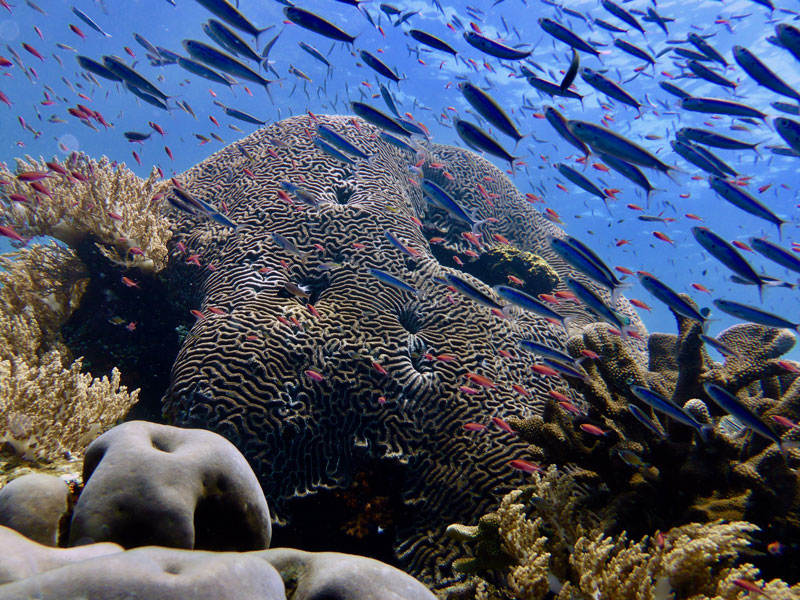by Víctor Planas-Bielsa (Centre Scientifique de Monaco and Université Côte d’Azur), Rachid Benchaouir (Coraliotech, Monaco), Denis Allemand (Centre Scientifique de Monaco and Université Côte d’Azur) and Didier Zoccola (Centre Scientifique de Monaco and Université Côte d’Azur)
Climate change affects coral reefs worldwide. To counter the anticipated disappearance of coral reefs by 2100, the World Coral Conservatory was created as a “Noah's Ark” for corals. In addition to providing a living coral repository to protect and restore degraded reefs, the project will offer a global big data structure to supply resources for fundamental research into corals and to assist biotechnology companies in developing promising molecules for human health applications.
Reef-building corals are the animals that constitute the foundation of coral reef ecosystems that provide habitat and trophic support for one-third of all marine organisms. The World Coral Conservatory (WCC) is an international community of research laboratories, public aquaria, stakeholders (such as park authorities, local decision-makers, policy makers, NGO representatives), and national administrations that builds on the idea of using aquaria as a “Noah’s Ark” to preserve corals. The Conservatory will function as global network, sharing biological material via a big data platform [1].
This collaboration is urgently needed, with climate change endangering many coral reefs (Figure 1), causing them to decline in size and biodiversity and with many species expected to face extinction by the end of the century. In addition to their ecological importance, coral reefs are economically essential for many human societies; more than 600 million people around the world depending directly on reefs for their survival. Moreover, corals possess numerous active substances that defend them against physical, chemical or biological threats. These substances could have promising applications, especially in the areas of human health and well-being [2].

The World Coral Conservatory: Offering New Hope for Corals
Despite its central role in the regulation of metabolic activities, structural functions, homeostasis and defence, the cell proteome, i.e. the protein/peptide content of the body's cells at a given time, has not been used in many applications for human health or other areas. The loss of coral reef biodiversity could mean lost opportunities to discover and take advantage of many bioactive substances.
For this reason, it is critical that in addition to the living coral repository, the genetic information is also preserved using coral genomic and transcriptomic databases. These should provide an invaluable source of in-silico raw material that can be exploited at any time in the future to discover and valorise innovative polypeptide-based products. Anti-cancer molecules, antibiotics, sun protection and new anti-inflammatory agents are some examples of products that can feed the pipeline of biotechnology companies looking for new pharmaceutical molecules or cosmetic active ingredients.
Computing technology will be instrumental in finding these substances, with artificial intelligence (AI) showing great potential as a tool for drug discovery [3]. Advances in deep learning and computer power will very likely open the door for numerous applications to analyse and discover promising molecules based primarily on data mining of the genomic information. Such techniques are not meant to replace already-known pharmacological protocols, but to complement them in order to accelerate the rate of discovery and reduce the cost and risk. The approach requires the collaboration of: (i) research teams specialising in fundamental science like mathematics, biology, ecology and bioinformatics, and (ii) biotechnology companies that can ensure the transition from research and development to industrial production.
Fundamental science is important, particularly at this stage; while the AI approach is promising, much research is still needed to develop statistical and mathematical techniques to efficiently handle the enormous size and high dimensionality of the genomic datasets.
The role of biotechnology companies is equally vital. It is their job to guarantee the toxicological safety and efficacy of the selected molecules, to secure innovations through patent filings and to commercialise their solutions through licensing or selling innovative products.
In conclusion, the WCC, based on a big data structure, will contribute to the development of biomedical and cosmetic applications and will help to maintain coral reefs as an ecological and economic resource for future generations.
References:
[1] D. Zoccola et al.: “The World Coral Conservatory (WCC): a Noah's ark for corals to support survival of reef ecosystems. Plos Biology 2020, 18(9): e3000823. doi.org/10.1371/journal.pbio.3000823
[2] Sang VT et al.: “Coral and Coral-Associated Microorganisms: A Prolific Source of Potential Bioactive Natural Products. Mar Drugs. 2019;17(8):468, 2019. doi:10.3390/md17080468
[3] J. M. Stokes et al.: “A Deep Learning Approach to Antibiotic Discovery”, Cell, Vol. 181, Issue 2, 2020, pp 475-483. doi.org/10.1016/j.cell.2020.01.021
Please contact:
Didier Zoccola, Centre Scientifique de Monaco, Principality of Monaco











